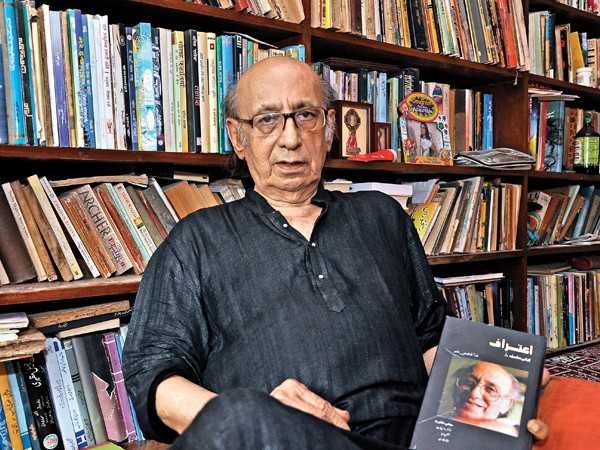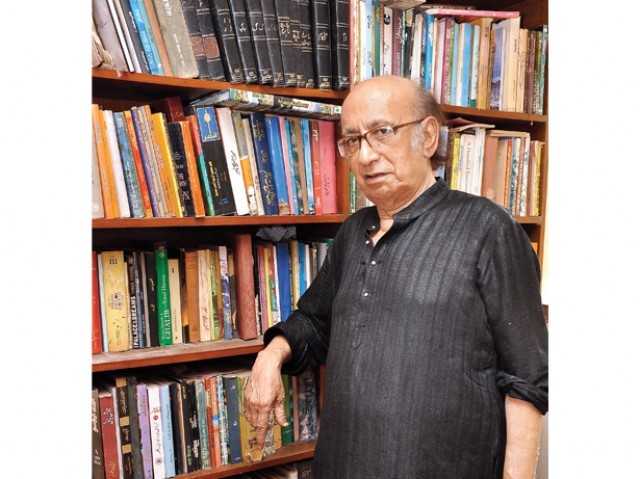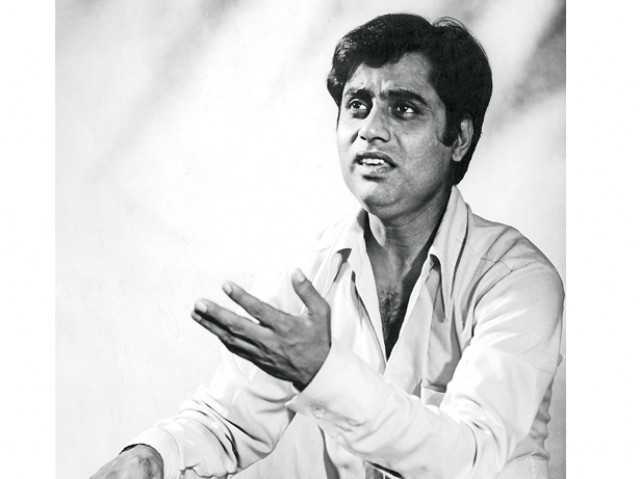
Two roads diverged in a wood, and I— I took the one less travelled by, And that has made all the difference.
Muqtida Hasan Nida Fazli sums up his nonconformist literary lattice in these lines from Robert Frost’s The Road Not Taken. That explains why writing lyrics is just one hue in his creative kaleidoscope. Author/writer/ poet Nida Fazli is a man of many mediums, many metaphors. Though not a prolific songwriter, the poignant beauty of his poetry has won merit amidst mediocrity. What better idiom can intoxication find than in Hosh walon ko khabar kya (Sarfarosh)? Who can remain unyielding to love in Tu iss tarah se meri zindagi mein shaamil hai (Aap Toh Aise Na The)... or remain unmoved by the existential angst in Kabhi kisi ko muqammil jahan nahin milta (Ahista Ahista)... or fail to find epiphany in Apni marzi se kahan apne safar ke hum hai (TV serial Sailaab)? Categorically, his pen has borrowed gravitas from myriad influences. The mysticism of Bhakti poets, the surrealism of Sufi thought, the existentialism of TS Eliot and European writers, the Marxist leanings of Russia and free India... Fazli is a sum of many parts.
BHAKTI OF LOVE
Born on October 12, 1938, the Gwalior-bred Nida Fazli is a maverick alright. Though father Dua Dubaivi was also a poet, Fazli found it difficult to relate to his traditional Daagh School of Poetry. What helped him discover his poetic language was heartbreak! The story goes that as a college student Nida was infatuated with a classmate. But one day he read about her death in an accident on the college’s notice board. “I felt a knot in my heart. I wanted to express my ache through verse but couldn’t,” confides the 76-year-old writer. “But one day I heard a pujari in a mandir singing Surdas’ pad ‘Madhu ban tum kat rahat harey...’ It was about Radha sharing the pain of separation from Lord Krishna with nature. The innocence of the relationship between nature and man appealed to me. I found a pattern to express myself in folk dialect.” Incidentally, years later his song Mere tere naam naye hain, yeh dard purana hai (Sudhir Mishra’s Is Raat Ki Subah Nahin, 1996) conveyed the pain of separation, intrinsic to life.
Coming back to his younger days, soon the student of English Literature, Fazli, began revelling in the poetry of Bhakti poets like Kabir and Meera and Sufi poets like Amir Khusro and Abdul Rahim Khan-E- Khana. Fazli, who has written around 20 books both in Urdu (Khoya Hua Sa Kuchh, Aankh Aur Khwab Ke Darmiyan) and Hindi (Humkadam, Safar Mein Dhoop To Hogi), asserts that Hindi and Urdu are similar with the difference only in script.
RADICAL VOICE
Life took a detour once again for young Fazli when post the riots in Gwalior in the mid ‘60s, his father migrated to Pakistan. He, however, chose to remain in India. “In my autobiography Deewaron Ke Beech, I’ve mentioned that my father was swayed by Mohammed Ali Jinnah (founder of Pakistan) while I was influenced by Maulana Abul Kalam Azad (freedom fighter),” he smiles. A ‘homeless bird’, he came to Mumbai and wrote for publications like Blitz and Dharmyug. As a precocious youngster, he took on stalwarts like Kaifi Azmi, Sardar Jaffrey and Sahir Ludhinavi in his book Mulaqatein for what he believed was their ‘fake’ Marxism. “I was fresh out of college and had great dreams. I found their communism paradoxical. I thought ye log aaram se flats mein rehte hain (just the way I do today) while talking about the mazdoor and the kisan. It seemed all preaching and no practice,” he explains his prejudice. “Naturally, they were upset. Eventually, I realised the truth. I even wrote for Sardar Jaffery’s magazine Guftagu for some time. But Sahir saab remained upset with me – shayad zaroorat se zyaada!”

LYRICS AND ME
Talking about his break as a lyricist in the ’80s, he narrates, “Kamal Amrohi saab had read my work and also liked Kabhi kisiko muqammil... So he was on a lookout for a ‘muqammiI’ (complete) poet to pitch in for Razia Sultan (1983) as Jan Nissar Akhtar saab, the original writer, had passed away.” Fazli contributed two songs - Tera hijr mera naseeb hai and Haryala banna aaya re – for Razia Sultan. “Kamal saab, being a perfectionist, took too long to make the film. In the meanwhile I signed many films thanks to his goodwill. A person of his stature had signed a newcomer like me. It boded well for me.” Fazli went on to write for Raj Kapoor (Biwi O Biwi) and Yash Chopra (Nakhuda). He also wrote Joh vaada khudse kiya tha for Silsila, which was sung by Pamela Chopra, but not included in the film.
His association with Mahesh Bhatt gave him the opportunity to write in Chahat and Tamanna in the ’90s. But it was Tanuja Chandra’s Sur – The Melody Of Life (2002), which won him mass popularity with all its tracks including Aa bhi jaa and Kabhi shaam dhale being chartbusters. Yet he continued to remain choosy. “I liked to work with directors who were literate. I chose subjects that were meaningful. But I did realise that box-office success is also important. Like the song Tumhari palkon mein yeh kya chupa hai in Nakhuda was a hit. But the film was not,” he looks back. “But I’m glad I didn’t limit myself to lyrics. Songs are written on demand in keeping with the conditions of language, tune and situation. But there’s freedom of thought and language in personal writing. I write columns for the BBC. I’m happy with the royalty I receive,” says the Sahitya Academy Award winner.
SUFI SENTIMENTS
Sensitive to the socio-political scenario in India he states, “Till date, we are polarised on the basis of religion. Politicians have made a business out of it. They target RK Laxman’s common man. The number of heads is important for them. But they don’t want those heads to think,” says Fazli who was targeted during the Mumbai riots in 1992. “A Hindu poet friend, Kamal Shukla, took me to his home,” he shares. “But one morning from his window, I saw a child going to school. I felt hopeful that the light of education would change things,” he says optimistically. A Mirza Ghalib aficionado he roots for the poet’s humanism, “Ghalib was the first to differentiate between ‘aadmi’ (man) and ‘insaan’ (human being). All life is a journey to cover this chasm. Had Ghalib been around he would have received so many fatwas!” In fact, Fazli invited the ire of the fundamentalists when he wrote, “Ghar se masjid hai bahut door, chalo yun kar le kisee rote huye bachche ko hansaaya jaaye,” for Mahesh Bhatt’s Tamanna. This Sufi slant was also evident in his lyrics for Govind Nihalani’s Dev (2004) like Piya ke rang rang deeni odhani. “Sufism is emotional and tolerant Islam. For me ibadat (worship) lies in appreciating a flower, in the khanak of my sister’s bangles, in the memories of my mother... My God dwells in a child’s laughter.”
He agrees with Buddha’s philosophy that change is the only reality and that one’s mindset changes with every phase of life. “My life is like an Indian train. I follow the rules of the compartment I am in – whether it’s the 1 class, the air-conditioned class or the second class. I live life in moments.” He believes restlessness is crucial to stay alive. “Aakhri saans tak beqaraar aadmi... (album Sajda). Without conflict, you develop indifference. Door chalke raaste sab ek se lagne lagte hain… so don’t let apathy seep in!”

JAGJIT AND I
Few know that Jagjit Singh was a post graduate from Ludhiana. Your region resides in your vocal chords. Jagit had settled in Rajasthan, hence his Urdu diction was perfect. He even read the Urdu script. During Sarfarosh, director John Mathew Mathan asked me to get Jagjit to sing Hoshwalon ko khabar kya, which was initially composed by Jatin-Lalit. Jagjit asked them to play the tune on the phone. But after he heard it, he refused to sing it. The metre and rhyme of the ghazal was out of sync. So they made other singers sing it. But Aamir Khan, the hero of the film, wanted only Jagjit to sing for him. So I spoke to Jagjit again. He said it was not ethically right to do so after others had sung it. Eventually, he agreed but only on one shart – that he would compose it. Also, the ghazal Apni marzi ke kahan apne safar ke (TV serial Sailaab) was recorded first in Talat Aziz’s voice. The director, Ravi Rai, however wanted it to be sung by Jagjit. Jagjit was hesitant as Talat had both sung and composed it. But Talat, a fine human being, urged Jagjit to sing it.
Hit Ghazals Of Nida Fazli sung by Jagjit Singh
Apni marzi se kahan apne safar ke hum hain
Har taraf, har jagah beshumaar aadmi
Duniya jise kehti hain
Safar mein dhoop toh hogi

SHOW COMMENTS